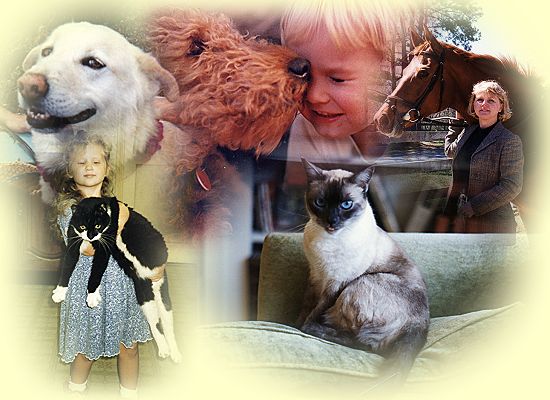Animal Communication
When to Use and How Can it Help?

Some of the situations in which you may find it helpful to talk with your animals with the assistance of an animal communicator include:
-
Deepening your understanding, intimacy and sacred bond with your animals by discovering what they are thinking, feeling and what means most to them
-
Understanding how your animals view their lives, their everyday likes and preferences and needs
-
Understand how your animals view your relationship, the purpose of your coming together, and how any past life issues may be relevant to the present
-
Behavioral Problems: Discovering the causes, negotiating changes and solutions
-
Understanding emotional issues such as fear, aggression, withdrawal, depression etc.
-
Helping to heal trauma, such as from injury, illness, death or grief
-
Helping rescue animals to understand sheltering and fostering, identify what they want in a new home (i.e. kids, other animals), adjust to new family and home, heal from neglect, abuse and abandonment
-
Understanding animals' view and experiences of illness and health problems; preparing an animal for surgery or other medical interventions
-
Supporting and understanding your animals' needs through death and dying
-
Talking with the Spirit of your animal after their death
-
Understanding and support through reincarnation reunions
-
Supporting and understanding your animals' needs through grief and anticipatory grief regarding death of other family members (animals grieve the death of animals and humans just like we do)
-
Helping your animals understand family structure changes: new arrivals of animals or humans; discussing your animals' needs before adding a new animal family member; departures of animals or humans through divorce, separation, etc.
-
Travel and moving: helping animals understand that their humans will return from business trips and vacations and who will care for them to reduce or prevent separation anxiety; showing them "pictures" of a new home beforehand, including any important physical boundary concerns.
Using Animal Communication to Help with Behavior Problems
Living with beings of different species can present challenges, especially since our cultures and our natural ways of living on the earth can vary so greatly.

Behavioral problems often occur when an animal acting naturally according to their culture (i.e., barking or digging, or sharpening little claws in our furniture), clashes with our preferred way of living (i.e., wanting peace and quiet, a yard without gaping holes, or an unfrayed sofa).
Everyone's tolerance level for certain behaviors varies. To help animals understand what we want and need regarding what we see as behavioral problems, it's very important to be clear about our boundaries, and to give on-going, careful consideration to what we can live with and what we cannot. For our animals to be able to meet our expectations, we must communicate clearly with them. At the same time, it's important to be open to the ideas, needs and requests your animal may reveal, and to be willing to express empathy for their reasons for doing what they're doing, even when we do not condone the behavior.
In an animal communication session, my stance is not to "take a side" and lecture your animal about what they are doing that is unacceptable to you, or to lecture you about how you might not be meeting your animal's needs. Rather, as in the process of mediation, my goal is to help both you and your animal clearly understand each others' positions and feelings regarding the problem, to be sure everyone involved understands how the problem impacts everyone else, and, whenever possible, to identify the deepest known root cause of the problem and to help negotiate solutions.
It is a precious gift to learn the root cause of what is creating emotional pain or imbalance for someone we love. It gives us the opportunity to empathize, and to collaborate in resolving the problem with clarity and compassion.
Animal communication helps us accomplish this.
For more in-depth information, you may want to read:
How to Use Animal Communication Effectively for Behavior Issues
Planning Guide for Before, During and After Your Consultation
Picture the Behavior You Want with a Postive Feeling Attached
Using Animal Communication to Help with Death and Dying
|
Losing an animal loved one can be one of the most painful experiences of our lives. Talking with our animals telepathically when they are ill, dying, or after their death can help ease our anxiety by helping us know what they want, assuring us that we are making informed decisions about critical issues. |
Just knowing what she wanted, knowing she was soon ready to go and needed help made all the difference in the world. I knew I wasn't guessing and that was an enormous relief. ~client with very ill cat |
When an animal is seriously ill, many people find it very useful to discuss the following kind of information:
- Asking if there is anything might make the animal more comfortable
- Explaining treatment options, their purpose, and what they can expect with with each particular medical intervention (i.e. will be away from home for surgery, may experience discomfort afterwards; may need to be given oral medicine) and asking for the animals' input, preferences or choices.
- Discussing the animals' preference about leaving their body on their own or whether they prefer or need help through euthanasia.
- Asking the animal if they could give a sign when they are ready or needing help to leave their body. This is an important question to ask when the animal's physical condition is likely to involve great pain or discomfort for them near the end. When both the animals and humans involved are comfortable with euthanasia as an end of life option, it can be extremely helpful for the humans to know what "signs" their animal may show them when they may need help to leave.
- When decisions about life extending treatments or euthanasia are imminent or may soon be imminent, asking the animals to explain from their perspective what a good "quality of life" is for them. Animals are as different as humans in their opinions and desires for certain quality of life issues. Some animals don't want to live with any pain, while others are tolerant of a great deal of pain. Some animals are comfortable with living with greatly diminished physical capacities, while others talk about being ready to leave their bodies when they are no longer able to walk. Talking with our animals about these critical choices takes the guess work out of what they feel and want. Knowing these things from their persepctive, rather than making assumptions, helps provide both a better experience for our animals and prevents potential guilt afterwards for us when we may wonder if we made choices in alignment with our animal’s wishes.
- Asking animals if they have any preference about what is done with their remains: Burial or cremation? Preference for placement of burial or ashes?
Example: Anastasia, when dying at the age of only four, told her person, "Mommy, I want my ashes buried at the place you go to meditate under the trees. When you come home from there I see the beautiful pictures of it in your mind and I feel the peace you get from there. That's where I want to be buried. Then whenever you come to meditate, we'll visit."
So Anastasia was buried there, in a sacred forest near the sea. And when her person visits there, she feels the sweet, soft love of Anastasia and they talk.
After their animal's death, many people find it helpful to speak with them about issues such as:
- What was it like for you near the end? Were you comfortable? Were you aware of all we were doing to help you?
- When you died, did anyone meet you, help you, greet you. . . who was there? Sometimes people ask certain beings to meet their animal, such as a Saint, animal or human loved one who has died, and take this opportunity to find out if those beings were there.
- Needing to express any regrets or issues they feel uncomfortable or guilty about.
- Express their deep love and gratitude for all that was shared.
- Whether the animal is coming back (reincarnating), when, where, what species and particular form, and how they will find and know each other.
Many people also take the opportunity to talk with surviving animals in the family to ask them how they might best be comforted in their grief, and what they need or want. This is also a time that many people ask them if they want another animal to join the family.
To learn more about the value and experience of talking with the spirit of your animal loved ones you may want to listen to the meditation in Legacies of Love, A Gentle Guide to Healing from the Loss of Your Animal Loved One.
Or you may want to read Animals in Spirit by Penelope Smith or Animals and the Afterlife by Kim Sheridan.
You may also be interested in the 4 hour audio: The Animals’ Persepectives of Death, The Other Side, and Coming Back








